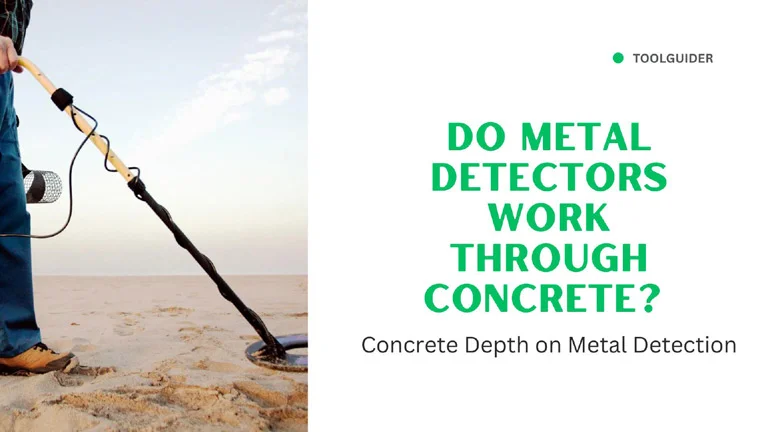
do metal detectors work through concrete
Do metal detectors work through concrete? Since the early 1920s, metal detectors have found diverse applications, capable of detecting various metallic objects concealed behind walls, floors, ceilings, or even buried within concrete.
Today’s metal detectors have become exceedingly accurate, capable of penetrating several feet of concrete, enabling the discovery of valuable items like coins, jewelry, firearms, and other prized possessions that were previously inaccessible without advanced technology.
Concrete, an artificial stone-like mass, is a composite material made by combining binding material (cement or lime) with aggregate (sand, gravel, stone, brick chips, etc.), water, admixtures, and other ingredients in particular quantities. The mixing proportions determine the strength and quality.
Concrete is a highly important and valuable material in buildings. After all of the materials – cement, aggregate, and water unit of measurement – have been combined in the proper amounts, the cement and water begin a reaction to bond themselves into a solid mass. This hardens the concrete’s rock-like bulk.
Metal Detection Methods for Concrete give trustworthy and precise findings while looking for hidden metal items. Metals of different types, including ferrous and non-ferrous elements, can be detected using such techniques within concrete blockwork, reinforced concrete buildings, and other media.
These methods use a variety of technologies to identify metallic components concealed deep inside the material without drilling or decimating the region to be investigated.
Pulse Induction Metal Detectors (PI), Ferroscope Metal Detectors (FS), Electro Magnetic Interference Detection (EMI), and Magnetic Flux Leakage Detectors are some examples of such detectors (MFL).
The science of metal detection is based on the principle of electromagnetic induction, and metal detectors can work through concrete to some extent. Metal detectors operate by generating an electromagnetic field when an alternating current passes through a coil in the detector’s search head.
When the electromagnetic field encounters a metallic object, it induces electrical currents within the metal. These induced currents, in turn, produce their secondary electromagnetic fields, which interfere with the original field in the metal detector. This interference triggers an alert, indicating the presence of a metal object.
Concrete is a dense material that attenuates or weakens the electromagnetic field emitted by metal detectors.
Thicker concrete layers absorb more of the electromagnetic energy, making it more challenging for metal detectors to penetrate and detect metal objects at greater depths.
Lower-frequency detectors offer better depth penetration but may be less sensitive to smaller objects.
Environmental factors, nearby metal structures, or electrical interference can create background noise that affects the metal detector’s readings, leading to false signals or masking the presence of small metal objects.
Concrete may contain various metallic components, such as rebar, wire mesh, or metal fixtures, which can complicate the discrimination process for metal detectors, potentially leading to false alarms.
Do metal detectors work through concrete? While metal detectors can work through concrete to some extent, their effectiveness is limited by concrete’s density and thickness.
For more accurate and detailed detection of metal objects within concrete, specialized equipment like ground-penetrating radar is often used. PI detectors are generally better at penetrating dense materials like concrete.
Ans: “Metal detector interference” or “metal detector shielding” materials contain conductive elements that can block or attenuate the electromagnetic fields emitted by metal detectors. The effectiveness of these materials depends on their composition and thickness. Electrically conductive minerals, soil minerals, and iron subterranean pipelines can all obstruct the signal of a metal detector.
Ans: As most metal detectors detect changes in magnetic fields, a big amount of iron can effectively block the signal. Stainless steel has a low magnetic permeability so it does not emit a strong enough signal to be identified. Gemstones, pearls, bones, diamonds, paper, and stone figurines are also not detectable by a metal detector.
Ans: Many “hot rocks” has iron-bearing minerals which will set off a metal detector. If rocks do not generate electromagnetic fields or interfere with the metal detector’s signals in the same way that metals do, metal detectors are not effective in detecting metal objects hidden inside solid rock.
Ans: The majority of metal detectors can detect things 4-8 (10 – 20 cm) deep. A mid-range metal detector can reach 12-18 (30-45 cm) underground in optimum conditions.
Ans: A security metal detector cannot be fooled since it detects metal using a magnetic field. Metal detectors play a significant role in enhancing security, aiding archaeological exploration, ensuring product quality, and assisting in various industrial applications.
I love all things tech, and I wear many hats – tech lover, business starter, digital marketer, and blogger. I know the ins and outs of Digital Marketing, SEO, SEM, SMM, and how to generate leads. My goal? Making things simple for you with clear guides and reviews. I stumbled upon WordPress while creating my first business site, and I fell in love with it right away. When I’m not building websites, creating content, or boosting clients’ online efforts, I’m focused on staying healthy, hanging out with family, and exploring the world. Connect with me on Facebook, Twitter, Linkedin, or read my complete biography.
The high-frequency vibrations of the Sonoshine teeth cleaner can break down and dislodge plaque giving…
Handmade cutting boards are available in a spectrum of styles from rustic and traditional to…
Pulse jet baghouse technology represents a significant advancement in industrial air pollution control systems. This article…
What is the difficulty of in-between purchases? Say you want a guitar. This might be…
How to find the best marble cutting boards? Marble cutting boards are manufactured with the…
A butcher block cutting board is traditionally used in butcher shops and kitchens for chopping…